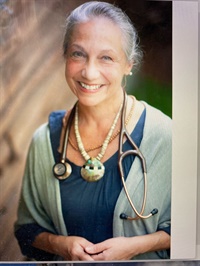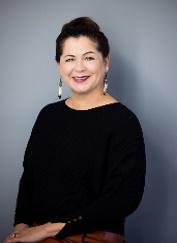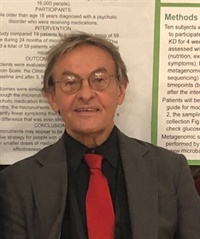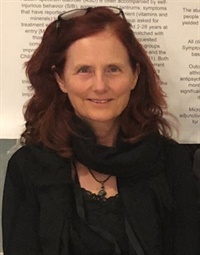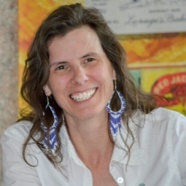Session Objectives:
- Discuss Maine's Truth & Reconciliation Commission (TRC) and describe how the work of the TRC and Maine-Wabanaki REACH was translated into the film Dawnland
- Understand the ways indigenous people are healing and finding wellness.
- Explain the importance of Wabanaki values in healing and community wellness.
- Define intergenerational trauma and historical trauma and effects of this trauma.
- Illustrate potential modifications in the medical and psychiatric approach for Maine's Indigenous population and describe innovative practices for healing from Wabanaki Public Health & Wellness.
Josephine Conte, DO, Maine Dartmouth Family Medicine Residency Program
Dr. Josie Conte is a faculty member with the Maine-Dartmouth Family Medicine Residency and the ONMM3 program, and cares for patients in Maine Dartmouth Collaborative Care Center and inpatient at the Alfond Center for Health, Maine General in Augusta. Her practice reflects traditional models of health and wellness including Osteopathy.
She is a 2011 graduate of UNECOM and completed residencies in family Medicine Residency and an NMM PlusOne Residency with Maine Dartmouth Family Medicine Residency in Augusta, ME. She is boarded in Family Medicine, Osteopathic Neuromusculoskeletal Medicine and Integrative Medicine. Dr. Conte is Assistant Professor of Clinical Family Medicine at the University of New England College Of Osteopathic medicine.
Josie is a Yoga Instructor RYT-200 with training as an Ayurveda Yoga specialist. She recently completed the Ayurveda Health Counselor training program with Boston Ayurveda School. She is presently studying with Yoga Veda Institute in the Ayurveda practitioner program.ShepracticesIntegrative Structural Acupuncture and incorporates Ayurvedic principles into patient care. She presently serves on the Maine Osteopathic Association Board of Directors where she is the co-chair of the Program and Education Committee. She is a Board member for the Coyote Institute for Studies in Change and Transformation.
She lives at the edge of Maranacook Lake in Winthrop with her husband, Nick. Her two adult children live in Maine as well.
Dr. Josie Conte, DO has no actual or potential conflict of interest, financial relationship/arrangement or affiliation with any entity producing, marketing, re-selling or distributing health care goods or services consumed by, or used on, patients.
Lisa Sockabasin, RN
Lisa Sockabasin, MS, RN Co-CEO, Wabanaki Public Health and Wellness Lisa Sockabasin is a citizen of the Passamaquoddy Tribe at Motahkomikuk with extensive experience in Tribal, State, and Federal governments, non-profits, and philanthropic organizations. In her capacity as the Co-CEO of Wabanaki Public Health and Wellness (WPHW), Lisa collaborates with tribal leadership, the WPHW team, and federal and philanthropic partners to address systemic inequities experienced by Wabanaki communities in Maine and to develop and implement culturally based programs that respond to the needs of our communities.
Lisa has over 20 years of experience addressing inequities experienced by and providing opportunities to tribal populations. Prior to joining WPHW, Lisa served as the Director of the Office of Health Equity in the Maine Department of Health and Human Services, as an epidemiologist in the Infectious Disease Program for the State of Maine, as a nurse epidemiologist with the North American Indian Center of Boston, Inc., and served for two decades as coordinator to the Brigham and Women’s Hospital and Harvard’s Four Directions Summer Research Program.
Lisa holds a B.S. in Biology from the University of Maine, a B.S. in Nursing from the University of Maine, and an M.S. in Health Policy and Management from the University of Southern Maine. She holds a graduate certificate in Non-Profit Management and serves on several boards including Maine Philanthropy Center, Planned Parenthood of New England, the ACLU of Maine, and the Maine Development Foundation.
Lisa Sockabasin, MS, RN Co-CEO has no actual or potential conflict of interest, financial relationship/arrangement or affiliation with any entity producing, marketing, re-selling or distributing health care goods or services consumed by, or used on, patients.
Lewis Madrona, MD
Lewis Mehl-Madrona, MD, graduated from Stanford University School of Medicine and trained in family medicine, psychiatry, and clinical psychology. He completed his residencies in family medicine and in psychiatry at the University of Vermont College of Medicine. He has been on the faculties of several medical schools, most recently as associate professor of family medicine at the University of New England. He continues to work with aboriginal communities to develop uniquely aboriginal styles of healing and health care for use in those communities. He is interested in the relation of healing through dialogue in community and psychosis. He is the author of Coyote Medicine, Coyote Healing, and Coyote Wisdom, a trilogy of books on what Native culture has to offer the modern world. He has also written Narrative Medicine, Healing the Mind through the Power of Story: the Promise of Narrative Psychiatry, and, his most recent book with Barbara Mainguy, Remapping Your Mind: the Neuroscience of Self-Transformation through Story. Lewis currently works with Wabanaki Public Health and Wellness, which serves the five tribes of Maine. He also works part-time at Acadia Hospital and with the Family Medicine Residency at Eastern Maine Medical Center. He serves on the Board of Directors of the Coyote Institute for Studies of Change and Transformation. Lewis has been studying traditional healing and healers since his early days and has written about their work and the process of healing. His primary focus has been upon Cherokee and Lakota traditions, though he has also explored other Plains Cultures and those of Northeastern North America. His goal is to bring the wisdom of indigenous peoples about healing back into mainstream medicine and to transform medicine and psychology through this wisdom coupled with more European-derived narrative traditions. He has written scientific papers in these areas and continues to do research. He writes a weekly (almost) blog on health and mental health for www.futurehealth.org. His current interests center around psychosis and its treatment within community and with non-pharmacological means, narrative approaches to chronic pain and its use in primary care, and further developing healing paradigms within a narrative/indigenous framework.
Lewis Mehl-Madrona, MD has no actual or potential conflict of interest, financial relationship/arrangement or affiliation with any entity producing, marketing, re-selling or distributing health care goods or services consumed by, or used on, patients.
Barbara Mainguy, MSW
Barbara studied psychology and philosophy at the University of Toronto and received her Master's degree in Creative Arts Psychotherapy from Concordia University in Montreal. Prior to that, she had worked as an artist and an artist in residence in the mental health system for a number of years. She received her M.S.W. from the University of Maine and works as a psychotherapist with Wabanaki Public Health and Wellness in Bangor, Maine where she also oversees the Crisis Service. She is certified in hypnosis and has taught hypnosis for the American Psychiatric Association, the New England Society for Clinical Hypnosis, and other organizations. She has worked in primary care settings as a behavioral health clinician and as a psychotherapist. Her interests include doing psychotherapy with people who have been diagnosed as psychotic, working with people who are having chronic pain, and exploring the interface between art and psychotherapy and healing. She enjoys group therapy and group medical visits. She is the author of a number of papers on health care with aboriginal people and on psychotherapy and psychosis and chronic pain. She has written a book with Lewis Mehl-Madrona, entitled Remapping Your Mind: the Neuroscience of Self-Transformation through Story. Currently, she has almost completed her M.F.A. in documentary film making through York University, Toronto. She is the Director of Education for the Coyote Institute in Orono and has a part-time private practice in Orono, Maine.
Barbara Mainguy has no actual or potential conflict of interest, financial relationship/arrangement or affiliation with any entity producing, marketing, re-selling or distributing health care goods or services consumed by, or used on, patients.
Esther Anne
Esther Anne is Passamaquoddy from Sipayik and a Policy Associate at the University of Southern Maine Cutler Institute where, she works on projects that engage and benefit tribal communities (Indian Child Welfare Act workgroup, Capacity Building Center for Tribes). Esther is a founding board member of Wabanaki REACH and had a primary role in the creation of the Maine Wabanaki-State Child Welfare Truth and Reconciliation Commission.


